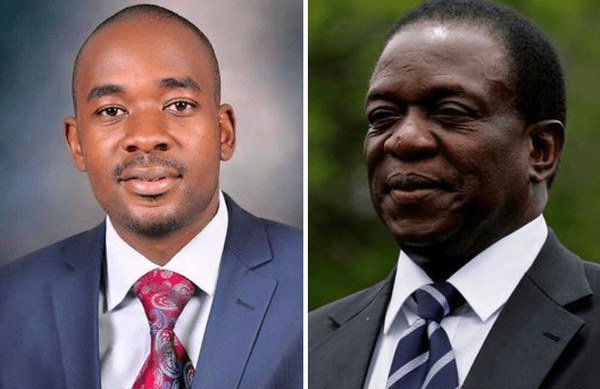By Farai Chirimumimba
The Zimbabwean upcoming harmonised elections are a chance for the people to make one of the most potent democratic statements since 2008. The choices available to the electorate are clear. The mainstream parties have polar opposite approaches and a policy to what they feel is the best for the country. Conflict politics as is currently happening over the voters’ roll that is alleged to be in shambles and transportation and storage of ballot paper.
The Zimbabweans are faced with the choice of returning Emmerson Mnangagwa’s ZANU-PF back to power after 38 years of misrule or electing Nelson Chamisa’s MDC Alliance, a grouping of seven political parties. War veterans and the Chiefs Council who have a history of backing ZANU-PF are also faced with a choice of whether to continue the ruling’s iron-clad hold with their support or whether they feel other parties represent their beliefs and can achieve what they want. The approaches being taken by the two main parties; that is, ZANU-PF and MDC Alliance are very different. The positioning that these parties are taking on nearly all matters are the farthest apart we have seen from them since election of year 2000.
On the one hand, we have ZANU-PF positioning themselves as a party of strength and stability and the best choice to guide Zimbabwe away from the November 2017 coup tag as such, Mnangagwa is seeking legitimacy through the upcoming harmonised elections in particular through the presidential election. On the other hand, we have MDC Alliance are positioning themselves as the party for the many and not the few through putting out policies ranging from infrastructure development, education to health which resonates well with the masses.
These differing approaches make for interesting observation ahead of an election that will decide “everything.” ZANU-PF taking the tough approach, putting emphasis on a vote for them will give Emmerson Mnangagwa a strong hand through a people’s mandate to ”freely” implement his strategy for economic resuscitation and MDC Alliance focusing on how the whole system is rigged and only works in favour of ZANU-PF. How these different approaches will resonate with the votes won’t be known until after the general election but it makes for interesting thoughts.
What is actually more important to voters’ post-Robert Mugabe era in modern Zimbabwean politics is having a government appear tough and strong or having a government that seeks to implement new policies and reform current laws? This relate to previous work published about how in contemporary politics in Zimbabwe, personality is much more important than policy. But in this election things are slightly different. While the focus on personality and policy is present, the way in which it is being manifested is different from what has been in the past.
What is happening now is that there is a divide; ZANU-PF is focusing on personality through seeking to legitimise Mnangagwa’s rule and MDC Alliance are focusing on policy. Thus far, no significant policy announcements have been made by ZANU-PF through their manifesto which has not been mentioned before and failed on implementation stage and MDC Alliance has not made a big deal about electing Nelson Chamisa so that he can be in a position of strength. This is not certainly by mistake, ZANU-PF may fear that their policies are so dreadful and rarely get to fruition that they have to promote Emmerson Mnangagwa’s personality despite it being tainted in so many ways from his role in Gukurahundi to the 2008 violent harmonised elections and MDC Alliance knows that Nelson Chamisa’s personality is so awful after having rail road himself to the helm through rubber stamping by the party’s National Council.
Having looked through ZANU-PF manifesto, it makes interesting reading. The phrase “Zimbabwe is open for business” is used several times. Within this manifesto there are no proper policy initiatives; just generic campaign rhetoric for instance of offering world class health and education facilities and job creation that they have failed to satisfactory provide in the past 38 years. But what is truly worrying is that this kind of campaigning ZANU-PF is doing l think also resonate with the electorate as a whole. This is because catchy small sound bites such as”create jobs”, fight corruption” and “strong and stable economy” are more appealing to a lot of electorate. Most of the voters in Zimbabwe don’t read manifestos anymore. Furthermore, with the whole issue of being open for business mantra is pandering to people who have dangerous nationalistic ideals, which ZANU-PF is fobbing off as patriotism. The election has much more than being open for business or legitimacy issue.
There are 23 presidential candidates and 55 political parties participating for hundreds of seats in parliament and council however, none of the candidates has been articulate on tax and spending. Zimbabwean are held has one of the most taxed people in the world but, no candidate is willing to say how they will deal with reducing tax burden on citizens and encourage saving and spending that stimulate the economy and create more jobs.
On a brighter note, 64 percent of the over 5, 6 million voters are aged between 18-40 years. This is excellent as this is the age group that is most disenfranchised with politics as a whole and yet it is mostly their future that is at stake. Overall levels of political participation have been on the rise too and l hope that this is a platform on which Zimbabwe’s democracy can grow and can maintain the future.
Democracy itself is not perfect by any means. One can chose to either participate or not in a vote. Although people have the right to abstain from an election, however, this harmonised elections are different in that the future of the country post-coup is bat stake therefore, it is important that all registered voters take part and vote on 30 July
